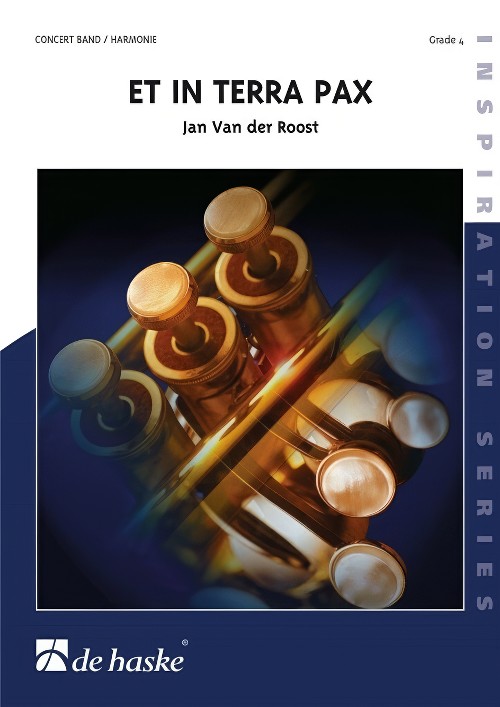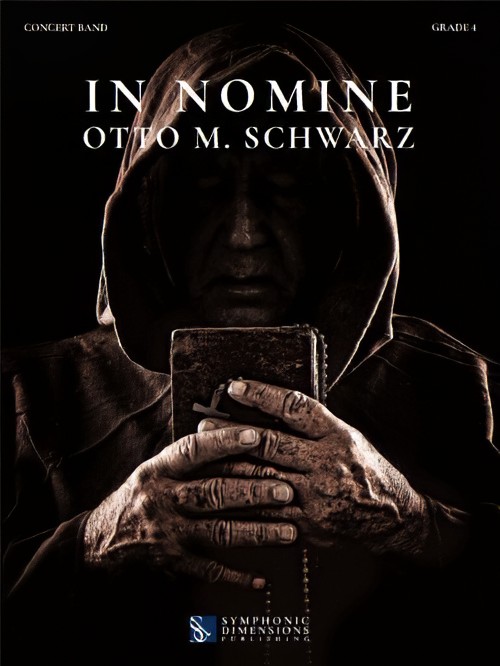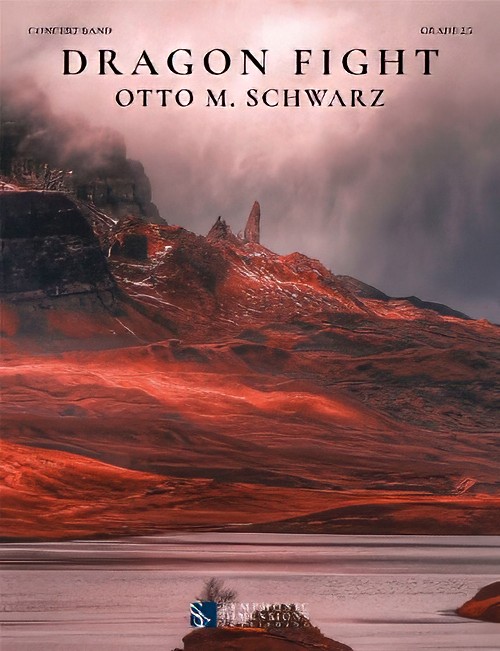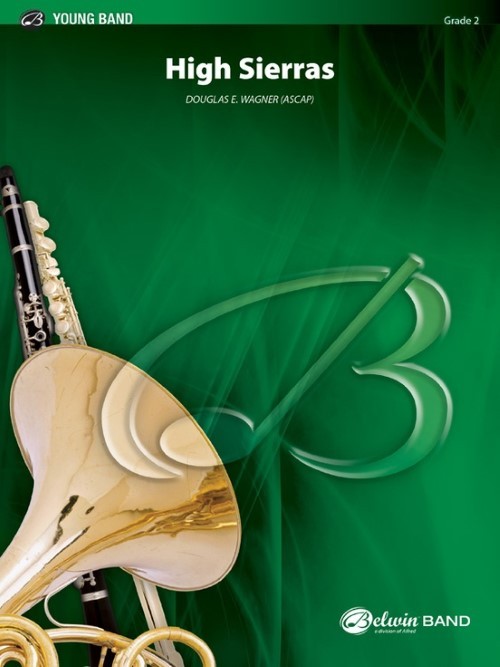Results
-
 £104.99
£104.99The Other Side - Stijn Roels
The Other Side was written as a farewell to a loved one. Following the melancholy theme of mourning in a minor key we also hear the happy memories in major key and also the knowledge that the person who has gone to 'a better place'is now at peace. This is a soulful and calm work that leaves plenty of space for the musicians' and listeners' own thoughts. This set includes optional parts for piano and vibraphone.
Estimated dispatch 7-14 working days
-
 £174.99
£174.99Et in terra Pax (Concert Band - Score and Parts) - Van der Roost, Jan
This piece was commissioned by the Concert Band Vlamertinge and is a plea for peace: the title translates as Peace on Earth. This is expressed by means of the vocal contribution expected from the performers. In various places of the piece you can recognize, the words Et In Terra Pax, an appeal for peace, at first jumbled together but later more rhythmically structured, developing into synchronized massed voices. The work starts with a pentatonic theme based on the notes D, E, G, A and C (taken from 'ConCErtbAnD VlAmErtinGE' and the name of the conductor, NiCk VAnDEnDriessChe). A somewhat sad melody is developed during an orchestral climax which leads to the first explosion of sound (measure 62 onwards). Suddenly the opening measures are recaptured, albeit with a differently coloured sound: the words Et in Terra Pax bring the first movement to a close. A restless Allegro follows which abruptly stops and is replaced by a calming chorale-like passage. A narrator reads aloud the poem 'Sonnet' by the young poet Charles Hamilton Sorley, who was killed during World War I. This poem fittingly puts into words the cruelty and senselessness of war. After the expanded recapitulation of the allegro, the broad, almost infinite atmosphere of the beginning returns. Clarinet and English horn play the pentatonic opening theme once more, this time broadly, while the words Et in Terra Pax are repeated again and again by the rest of the ensemble. The composer has purposely avoided all forms of aggression and bombastic sounds regularly used in works about war. Fear of violence and destruction can be heard and felt during the allegro passages. The charged opening makes way in the end for hope: May peacefulness replace cruelty in everyday life, too.Duration: 13:45
Estimated dispatch 7-14 working days
-
 £174.99
£174.99Et in terra Pax - Jan Van der Roost
This piece was commissioned by the 'Concert Band Vlamertinge' and is a plea for peace: the title translates as 'Peace on Earth'. This is expressed by means of the vocal contribution expected from the performers. In various places of the piece you can recognize, the words 'Et In Terra Pax' - an appeal for peace - at first jumbled together but later more rhythmically structured, developing into synchronized massed voices.The work starts with a pentatonic theme based on the notes D, E, G, A and C (taken from 'ConCErtbAnD VlAmErtinGE' and the name of the conductor, NiCk VAnDEnDriessChe). A somewhat sad melody is developed during an orchestral climax which leads to the firstexplosion of sound (measure 62 onwards). Suddenly the opening measures are recaptured, albeit with a differently colored sound: the words 'Et In Terra Pax' bring the first movement to a close. A restless Allegro follows which abruptly stops and is replaced by a calming cho-rale-like passage. A narrator reads aloud the poem 'Sonnet' by the young poet Charles Hamilton Sorley, who was killed during World War I. This poem fittingly puts into words the cruelty and senselessness of war. After the expanded recapitulation of the allegro, the broad, almost infinite atmosphere of the beginning returns. Clarinet and English horn play the pentatonic opening theme once more, this time broadly, while the words 'Et In Terra... Pax' are repeated again and again by the rest of the orchestra.The composer has purposely avoided all forms of aggression and bombastic sounds regularly used in works about war. Fear of violence and destruction can be heard and felt during the allegro passages. The charged opening makes way in the end for hope: May peacefulness replace cruelty in everyday life, too.
Estimated dispatch 7-14 working days
-
 £149.99
£149.99Colditz Castle - Rob Goorhuis
Written as a commission by the Stichting de Inrichting foundation of Wijk bij Duurstede (the Netherlands), Rob Goorhuis Requiem voor de mens (Requiem for Man) on lyrics by Andr van Zwieten was composed in the year 2001. This work for choir andwind-band greatly impressed the audience, whilst its composer remained obsessed by its war theme. When he subsequently heard that the Rundfunk Blasorchester from the German town of Leipzig -a place not far from Colditz - was to dedicate a CDto his work, Rob Goorhuis got the idea to process some of the themes from his Requiem for Man into an instrumental composition about the famous Colditz castle. a place still bearing the scars of war. From 1933 to 1934, the castle was aSchutzhaftlager. During the Second World War, it was used as a prison for senior officers. From this prison, many escapes were undertaken, which even resulted in the castle being nicknamed The Escape School. In the seventies, a television-seriesabout this period made the castle very well-known with the public at large.The despondent tone of the opening theme underscores the sadness caused by wars and violence. Nevertheless the works ending is hopeful and triumphant. Peace iscelebrated, but with the hope for a lasting peace sadly remaining a topical issue to the present moment.
Estimated dispatch 7-14 working days
-
 £159.99
£159.99In Nomine (Concert Band - Score and Parts) - Schwarz, Otto M.
How often has something been justified by, declared to be, or blessed as 'in the name of' some cause or other? How can it be that opposing armies and the use of weapons are ever 'in the name of...'? This is a common thread in the history of different faiths. Good was created but evil was committed and all 'in the name of...' This thread is also found in the history of the Premonstratensian Abbey at Wadgassen. The abbey was built in the 12th century on unfertile, desolate moorland, which later evolved into the most powerful religious community in the Saarland. The history of the abbey records quite astounding achievements under the motto desertum florebit quasi lilium ('the desert will bloom like a lily'); but also the harsh treatment of delinquents. The order had its own school, in which children were taught the seven liberal arts (which included music as well as geography and astronomy), but the poor were left to starve outside the abbey walls and were only allowed to eat from the members' leftovers on feast days. The medieval witch trials demanded their pound of flesh, and one group that fell victim were ecstatic dancers who moved wildly to music, which was interpreted as the devil's work. The result: a show trial that sentenced the dancers to death by fire. All in the name of... The year is 1789: Abbot Bordier is in the tenth year of his command. He does not yet know that he is to be the last abbot of an almost 700-year tradition. Not far from the abbey is the French border, which has long been making itself felt with the sound of gunfire, and the brothers continue to keep a nervous eye on it. The first portents of the French Revolution loom, but no one wants to believe it, that is, until the French pound the door down, storm the abbey and come right into the brothers' chambers. In a blind fury, all the pipes of the abbey organ are torn out, icons beheaded with swords and brothers beaten death while numerous buildings are set on fire. The abbey church is in flames. A frantic and desperate escape begins. Abbot Bordier and a handful of brothers make their getaway via the River Saar, adjacent to the abbey, to the neighbouring village of Bous. They survive, but their life, the Premonstratensian abbey, is destroyed. While they flee towards Prague and the sanctuary of the Strahov Monastery, the abbey at Wadgassen is razed to the ground and becomes a stone quarry. The desert blooms once more, however. A few short decades later, a glasswork arises from the foundations of the abbey. As peace returns to the region, it brings jobs and a new vision for its people.Duration: 11.15
Estimated dispatch 7-14 working days
-
 £78.50
£78.50Dragon Fight (Concert Band - Score and Parts) - Schwarz, Otto M.
At the best viewpoint over the Alps of Liechtenstein, the village of Guflina is situated. Underneath the overhanging ledge, there is said to have been a cave in the mountain. In it lived a terrible dragon that was on the rampage on the surrounding meadows, spreading fear and terror among the population. At the same time there lived a giant man up in Guflina, who had the strength of twelve normal men. The farmers implored him to help them in their distress. The giant ventured to fight the dragon and was lying in wait above the cave. When the dragon refused to appear, the giant threw stones into the entrance of the cave. They got into a fight, which the giant only just won with difficulty. Since that day, people have lived in peace and prosperity.Duration: 7.15
Estimated dispatch 7-14 working days
-
 £53.95
£53.95High Sierras (Concert Band - Score and Parts) - Wagner, Douglas E.
Picture the towering majesty of mountains, wreathed in clouds at times, brilliant in sunshine at other times. The serene grandeur and beauty are testaments to peace within nature and within the soul of man. Douglas Wagner's overture for band presents an opportunity in performance to scale new heights in dramatic expression and allows all elements of the human spirit to focus on the beauty of sound Captivating!Duration: 3.45
Estimated dispatch 7-14 working days
-
 £194.99
£194.99The Year 1941 - Serge Prokofieff
The Year 1941 was composed during the second World War. Prokofiev, along with other composers, was evacuated to the Caucasus when Germany started attacking the Soviet Union in 1941. It was under such circumstances that Prokofiev began work on this symphonic suite. He was working on his epic opera War and Peace and the String Quartet No. 2 at the same time. It is an orchestral suite in three movements, a poignant and evocative musical depiction of a tumultuous period in history. The composer described these three movements as follows: I. In Battle - "a scene of heated battle, heard by the audience sometimes as though far away and sometimes as though on the actual battlefield."II. At Night - "a poetic night scene, disturbed by the tension of impending conflict. III. For the Brotherhood of Man - "a triumphant lyrical hymn to victory and the brotherhood of peoples."
Estimated dispatch 7-14 working days
-
 £119.99
£119.99The Saint of the Forest - Thomas Doss
Whenever hikers got lost in the fog at the 'Steinernen Steg' in Burgebrach in the gloomy autumn and winter time, Ursula von Windeck would appear in a white robe to show them the way, standing still for a while and eventually disappearing in tears. It was only when a lost girl thanked her for her help that Ursula was redeemed from her curse and found peace. The girl had a shrine for Ursula erected at the site of her rescue.
Estimated dispatch 7-14 working days
-
 £78.50
£78.50Dragon Fight - Otto M. Schwarz
At the best viewpoint over the Alps of Liechtenstein, the village of Guflina is situated. Underneath the overhanging ledge, there is said to have been a cave in the mountain. In it lived a terrible dragon that was on the rampage on the surrounding meadows, spreading fear and terror among the population. At the same time there lived a giant man up in Guflina, who had the strength of twelve normal men. The farmers implored him to help them in their distress. The giant ventured to fight the dragon and was lying in wait above the cave. When the dragon refused to appear, the giant threw stones into the entrance of the cave. They got into a fight, which the giant only just won with difficulty. Since that day, people have lived in peace and prosperity.
Estimated dispatch 7-14 working days
